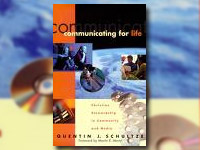Communicating for Life: Christian Stewardship in Community and Media (Quentin Schultze, 2000)

One of the riches of Christian community is being able to learn from sisters and brothers who have very different callings from our own. I’m not just referring to networking here, nor to the fact that in an age of information so many resources are available in the marketplace. Both are good gifts, but more than that should be found in the church, because our learning from one another is in the context of covenant community. Rather than merely tapping into a network, we are members of the same family. A family in which every calling is significant, and every member is needed. And because our faith gives us a common perspective under Christ’s Lordship, we can learn from one another not across world views, but under the authority God’s word. As we each seek to think and live Christianly within the sphere of our particular calling and vocation, we can share the fruit of our pilgrimage with our fellow believers. The community will sharpen our discernment with their questions, and they can profit from what we’ve learned and tried, and in how we have succeeded by God’s grace, and failed.
Sadly, such learning from one another occurs all too infrequently. Relatively few believers have done the hard work of developing a Kingdom vision for their calling and life, and relatively few opportunities exist to share in that process together in the average church.
In Communicating for Life, Quentin Schultze demonstrates what such faithfulness looks like. Dr. Schultze is professor of communication at Calvin College, and though few of us may be called to the field of communications, all of us are called to be faithful communicators. “We are inherently, incessantly communicators of whatever is in our hearts,” Schultze points out. “It is a sobering fact that virtually everything we do can communicate something to someone else.” In all that we do and say—and in all that we do not do and do not say—we are either promoting shalom or brokenness, for nothing in our lives is neutral and outside the sphere of Christ’s Lordship.
Dr. Schultze does several things admirably in Communicating for Life. He shares with us what he has learned in his calling as a professional communicator so we can reflect on how to communicate more faithfully. Schultze also allows us insight into his vocation, so we can see something of what it means to work within that sphere of life. He outlines the main theories of communication prevalent in his field, so we can understand something of their strengths and weaknesses from a Christian perspective. Written without technical jargon and in a way that makes the ideas and theories accessible to lay communicators, his example encourages us all to be discerning in our own calling and work. And most helpful of all, he sets his entire discussion clearly in the context of the Christian world view, allowing the biblical story of Creation, Fall, and Redemption to shape his approach. Communicating for Life not only allows us to learn to be more faithful in our own communication, it is a model for thinking Christianly about one’s calling and vocation.
I almost didn’t read this book, because it is written as a textbook for use in classes on communication in Christian colleges. Over the years, however, I have come to appreciate and learn from Dr. Schultze in the various books he has published, so I read his introduction, and immediately knew Communicating for Life was must reading. To listen as a thoughtful fellow believer reflects on his calling in light of the Christian world view, and as he helps us reflect on some of what his calling implies for our own faithfulness is a learning opportunity too good to be missed. In fact, I wish he had written more. More about postmodernism and how the shift in culture affects communication. More about the ethical dilemmas that we all face as we try to communicate in a fallen world. And I wish he had included discussion questions, because Communicating for Life shouldn’t just be read in college classes, but discussed in Sunday school classes and small groups.
This is a book about listening and identifying with people quite unlike ourselves. About speaking the truth in love, and how that differs from just speaking the truth. About how all our best efforts to communicate are flawed, and about how God still uses us. About how we are called to be co-creators with God, symbolic stewards of his good creation. About telling the truth and about when telling a lie might be the better choice in this sad world. About love and accountability, forgiveness and humility, and about how faithful communication by God’s grace is not only a foretaste of heaven, it is also a conduit for shalom in the here and now.

